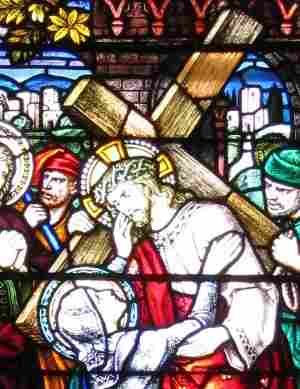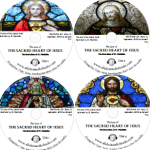The Love of Jesus Christ : Part 6
Download MP3 of The Love Shown to Us By Jesus Christ in His Passion Part 6:Jesus Crucified is our only Hope in all our wants. (Right Click and Select Save As)
Click To Download the Entire Catholic Audiobook : The Love Shown to us by Jesus in his Passion.
Transcript
Jesus Crucified is our only Hope in all our wants.
There is no salvation in any other, St. Peter says that all our salvation is in Jesus Christ, who, by means of the cross, where he sacrificed his life for us, opened us a way for hoping for every blessing from God, if we would be faithful to his commands.
Let us hear what St. John Chrysostom says of the cross: “The cross is the hope of Christians, the staff of the lame, the comfort of the poor, the destruction of the proud, the victory over the devils, the guide of youth, the rudder of sailors, the refuge of those who are in danger, the counselor of the just, the rest of the afflicted, the physician of the sick, the glory of martyrs.” The cross, that is, Jesus crucified, is The ‘hope of the faithful, because if we had not Jesus Christ we should have no hope of salvation. It is the staff of the lame, because we are all lame in our present state of corruption. We should have no strength to walk in the way of salvation except that which is communicated to us by the grace of Jesus Christ.
It is the comfort of the poor, which we all are, for all we have we have from Jesus Christ.
It is the destruction of the proud, for the followers of the Crucified cannot be proud, seeing him dead as a malefactor upon the cross. It is victory over the devils, for the very sign of the cross is sufficient to drive them from us. It is the instructor of the young, for admirable is the teaching which they who are beginning to walk in the ways of God learn from the cross. It is the rudder of mariners, and guides us through the storms of this present life. It is the refuge of those in danger, for they who are in peril of perishing, through temptations of strong passions, find a secure harbor by flying to the cross. It is the counsellor of the just, for how many saints learn wisdom from the cross, that is, from the troubles of this life. It is the rest of the afflicted, for where can they find greater relief than in contemplating the cross, on which a God suffers for love of them? It is the physician of the sick, for when they embrace it, they are healed of the wounds of the soul. It is the glory of martyrs, for to be made like Jesus Christ, the King of Martyrs, is the greatest glory they can possess.
In a word, all our hopes are placed in the merits of Jesus Christ. The Apostle says. I know how to be humbled, and I know how to abound; how to be satisfied, and how to hunger; how to abound, and how to suffer poverty. I can do all things in Him who strengthens me. Thus St. Paul, instructed by the Lord, says, I know how I ought to conduct myself: when God humbles me, I resign myself to his will; when he exalts me, to him I give all the honor; when he gives me abundance, I thank him; when he makes me endure poverty, still I bless him; and I do all this not by my own strength, but by the strength of the grace which God gives me. For he that trusts in Jesus Christ is strengthened with invincible power.
The Lord, says St. Bernard, makes those who hope in him all-powerful. The saint also adds that a soul which does not presume upon its own strength, but is strengthened by the Word, can govern itself, so that no evil shall have power over it; and that no force, no fraud, no snare can cast it down.
The Apostle prayed thrice to God that the impure temptations which troubled him might be driven away, and he was answered, My grace is sufficient for thee, for My strength is accomplished in weakness? How is this that the virtue of perfection consists in weakness? St. Thomas, with St. Chrysostom, explains it, that the greater our weakness and inclination to evil, the greater is the strength given us by God. Therefore, St. Paul himself says, I will gladly, therefore, glory in my infirmities, that the strength of Christ may dwell in me. Therefore, I take pleasure in my infirmities, in insults, in necessities, in persecutions, in straits for Christ’s sake; for when I am weak, then I am strong.
For the word of the cross is to them that perish foolishness, but to those who are saved it is the power of God. Thus St. Paul warns us not to follow after worldly men, who place their trust in riches, in their relatives and friends in the world, and account the saints fools for despising those earthly helps; yet men ought to place all their hopes in the love of the cross, that is, of Jesus crucified, who gives every blessing to those who trust in him. We must further remark that the power and strength of the world is altogether different from that of God; it is exercised in worldly riches and honors, but the latter in humility and endurance. Wherefore St. Augustine says that our strength lies in knowing that we are weak, and in humbly confessing what we are. And St. Jerome says, that this one thing constitutes the perfection of the present life, that we should know that we are imperfect. For then we distrust our own strength, and abandon ourselves to God, who protects and saves those who trust in him. He is the protector of all who hope in Him, says David. Thou savest those who hope in Thee. He that trusts in the Lord is like the Mount Sion, which is never removed? Therefore St. Augustine reminds us that, when we are tempted, we must hasten and abandon ourselves in Jesus Christ, who will not suffer us to fall, but will embrace and hold us up, and thus remedy our weakness.
When Jesus Christ took upon himself the weaknesses of humanity, he merited for us a strength which conquers our weakness: For in that He Himself hath suffered and been tempted, He is powerful to help those who arc tempted? How is this, that the Saviour in being himself tempted, became able to strengthen us in our temptations ? It is meant that Jesus Christ, by being afflicted by temptations, became more ready to feel for us and help us when we are tempted. To this corresponds that other text of the same Apostle, We have not a High Priest who cannot feel compassion for our infirmities; but was in all things tempted like us, though without sin. Therefore let us go with confidence to the throne of grace, that we may obtain mercy, and find grace in the help we need?
Jesus himself, in enduring fears, weariness, and sorrows, as the Evangelists bear witness, speaking especially of the afflictions that he endured in the garden of Gethsemani the night before he suffered, has merited for us a courage to resist the threats of those who would corrupt us, a strength to overcome the weariness we experience in prayer, in mortifications, and other devout exercises, and a power of enduring with peace of mind that sadness which afflicts us in adversity.
We must also know that he himself in the garden, at the sight of all the pains and the desolate death that he was about to endure, chose to suffer this human weakness. The spirit indeed is ready, but the flesh is weak;” and he prayed to his divine Father that, if it were possible, the cup might pass from him. But immediately he added, “Nevertheless, not as I will, but as Thou wilt.” And for the whole time that he continued praying in the garden, he repeated the same prayer, Thy will be done; and the third time he prayed, saying the same thing. With those words, Thy will be done? Jesus Christ merited and obtained for us resignation in all adversity, and gained for his martyrs and confessors a strength to resist all the persecutions and torments of tyrants. “This world,” says St. Leo, ” inflamed all the confessors, it crowned all the martyrs.”
Thus also by the horror that he experienced through our sins, which caused him to fall into a bitter agony in the garden, he merited for us contrition for our sins. By the abandonment by the Father which he suffered on the cross, he merited for us strength to retain our courage in all desolations and darknesses of spirit. By bowing his head in death upon the cross, in obedience to the will of the Father, he merited for us all the victories which we gain over passions and temptations; and patience in the pains of life, and especially in the bitternesses and straits which we endure in death. In a word, St. Leo writes that Jesus Christ came to take our infirmities and distresses, in order to communicate to us his strength and constancy.
St. Paul says, that though he was the Son of God, he learned obedience in the things that he suffered ; from which we are to understand, not that Jesus in his Passion learned the virtue of obedience, and did not know it beforehand, but, as St. Anselm says, he learned not only by the knowledge which he had before, but by actual experience, how grievous was the death he endured in order to obey his Father. And at the same time he experienced how great is the merit of obedience, for by this he obtained for himself the utmost height of glory, which is the seat at his Father’s right hand, and eternal salvation for us. Therefore the Apostle adds, Being perfected, He became the cause of eternal life to all them that obey Him* He says, being perfected, because, having completely fulfilled all obedience, by suffering patiently what he endured in his Passion, Jesus Christ became the cause of eternal life to all those who obediently suffer with patience the troubles of this present life.
By this patience of Jesus Christ the holy martyrs were animated and strengthened to embrace with pa- tience the most cruel torments that the cruelty of tyrants could devise ; and not only with patience, but with joy and desire to suffer for the love of Jesus Christ. In the celebrated letter which St. Ignatius the martyr wrote to the Romans after he had been condemned to be thrown to the wild beasts, and before he went to the place of his martyrdom, we read, “Suffer me, my children, to be ground down by the teeth of the wild beasts, that I may become corn for my Redeemer. I seek only him who died for me. He who is the only object of my love was crucified for me, and the love I bear to him makes me desire to be crucified for him.” St. Leo writes of St. Laurence the martyr, that when he lay upon the gridiron, the flames which burned him without were less hot than the fire that burned within him. Eusebius Palladius relate of St. Potamena, a virgin of Alexandria, that when she was condemned to be thrown in a caldron of boiling pitch, that she might suffer the more for the love of her crucified Spouse, she prayed the tyrant to have her thrust in little by little, that her death might become more torturing; and she had her desire, for they began by thrusting her feet into the pitch, so that she was for three hours in this torment, and did not die till the pitch reached her neck. Such was the patience, such the fortitude which the martyrs gained from the Passion of Jesus Christ.
It was this courage which the Crucified infuses into those who love him, that made St. Paul say, Who shall separate us from the love of Christ? Shall tribulation, or distress, or hunger, or nakedness, or perils, or persecution, or the sword ‘ And at the same time he says “all these things we are conquerors through Him who loved us.” The love of the martyrs for Jesus Christ was unconquerable, because it gained its strength from him who is unconquerable, who strengthened them to suffer. And let us not imagine that the torments of the martyrs were miraculously deprived of their power of torturing, or that their heavenly consolations lulled the pains of the torments; this perhaps may sometimes have happened, but ordinarily they truly felt all their pains, and many through weakness yielded to the pangs; so that in the case of those who were constant in suffering, their pateince was entirely the gift of God, who gave them their strength.
The first object of our hopes is eternal blessedness, that is, the blessedness of God, — the fruition of, St. Thomas teaches. And all the means which are necessary for obtaining this salvation, which consists in the enjoyment of God, such as the pardon of our sins, final perseverance in divine grace, and a good death, we must hope for, not from our own strength, nor our good resolutions, but solely from the merits and grace of Jesus Christ. That our confidence, therefore, may be firm, let us believe with infallible certainty that we must look for the accomplishment of all these means of salvation only from the merits of Jesus Christ.
Resources
Saint Alphonsus Ligouri, The Passion and Death of Jesus Christ, Benziger Brothers, 1887, pg 336-345
Picture used with Permission of Attribution License was Cropped by AABooks
You may also like:
- The Love Shown to us by Jesus Christ in his Passion: Part 5 What it is to live and die for Jesus?
- The Love Shown to us by Jesus Christ in his Passion: Part 4 Jesus died for us; we ought to live and die for Him.
- The Love Shown to us by Jesus Christ in his Passion: Part 3 Jesus died not only for us all, but for each one of us.
- The Love Shown to us by Jesus Christ in his Passion: Part 2 The Son of God Offered Himself for the Love of Us
- The Love Shown to us by Jesus Christ in his Passion: Part I God so loved men, that He gave His own Son to redeem them.
- Catholic Audiobook : The Love Shown to us by Jesus in his Passion.
- Catholic Audiobook: The Betrayel Of Judas and The Denial of Peter






